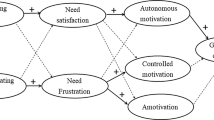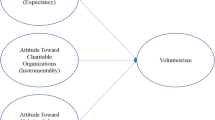Abstract
Although today’s nonprofit organizations make a strong appeal to volunteers, they often have difficulties with attracting and retaining these free labor forces. In this sense, studying the motivation of volunteers and its effects proves useful. In the present article, we investigate the relationship between volunteers’ motivation and their self-reported work effort, while relying on the Self-Determination Theory. The results indicate a positive link between volunteers’ autonomous motivation and work effort. Moreover, this relationship holds for each person in our sample, irrespective of the organization in which she/he is volunteering. Implications for future research, as well as the practical impact of these findings, are discussed.
Résumé
Bien que les organisations sans but lucratif recourent énormément de nos jours aux volontaires, elles rencontrent souvent des difficultés pour attirer et retenir ces effectifs bénévoles. C’est à cet égard que l’étude de la motivation des volontaires et des effets de celle-ci s’avère utile. Dans le présent article, nous étudions la relation entre la motivation des volontaires et les efforts de travail dont ils font eux-même état, tout en nous appuyant sur la Théorie de l’autodétermination. Les résultats indiquent un lien positif entre la motivation autonome des volontaires et l’effort de travail. En outre, cette relation existe pour chaque personne dans notre échantillon, indépendamment de l’organisation où elle fait du volontariat. Les implications pour la recherche future, ainsi que l’impact pratique de ces constatations, font l’objet d’une discussion.
Zusammenfassung
Obwohl Nonprofit-Organisationen heutzutage einen eindringlichen Appell an ehrenamtlich Tätige richten, haben sie doch oftmals Schwierigeiten, diese freien Arbeitskräfte anzuziehen und zu halten. In diesem Sinne erweist es sich als nützlich, die Motivation ehrenamtlich Tätiger und deren Auswirkungen zu untersuchen. In dem vorliegenden Beitrag betrachten wir das Verhältnis zwischen der Motivation ehrenamtlich Tätiger und den von ihnen angegebenen Arbeitseinsatz, wobei wir uns auf die Selbstbestimmungstheorie stützen. Die Ergebnisse lassen eine positive Verbindung zwischen der autonomen Motivation der ehrenamtlich Tätigen und dem Arbeitseinsatz erkennen. Außerdem trifft dieses Verhältnis auf alle Personen in unserer Stichprobe zu, unabhängig von der Organisation, für die sie ehrenamtlich tätig sind. Die Implikationen für zukünftige Forschungen sowie die praktischen Auswirkungen der Ergebnisse werden diskutiert.
Resumen
Aunque las organizaciones sin ánimo de lucro de la actualidad apelan con fuerza a los voluntarios, a menudo tienen dificultades para atraer y retener a estas fuerzas laborales gratuitas. En este sentido, resulta útil estudiar la motivación de los voluntarios y sus efectos. En el presente artículo, investigamos la relación entre la motivación de los voluntarios y el esfuerzo de trabajo notificado por ellos mismos, basándonos en la Teoría de la Auto-Determinación. Los resultados indican un vínculo positivo entre la motivación autónoma de los voluntarios y el esfuerzo de trabajo. Asimismo, esta relación se mantiene para cada persona de nuestra muestra, independientemente de la organización en la que realiza el voluntariado. Se tratan las implicaciones para futuras investigaciones, así como también el impacto práctico de estos hallazgos.
ملخص
尽管如今的非营利组织向志愿者进行强烈呼吁,但他们往往难以吸引和留住这些免费劳动力。在此意义上说,研究志愿者的动机及其影响是具有意义的。本文基于自我决定理论,对志愿者的动机与其自报的工作投入之间的关系展开调查。结果表明,志愿者的自主动机与工作投入之间具有积极的联系。此外,这种关系适用于调查样本中的每个人,与其服务的组织无关。本文还探讨了本研究对今后研究的影响以及研究结果的实际影响。.
摘要
على الرغم من أن المنظمات الغير ربحية اليوم تستنجد بقوة بالمتطوعين، فإنهم غالبا˝ ما يواجهون صعوبات في إجتذاب وإبقاء هذه القوى العاملة المجانية. في هذا المعنى، دراسة دوافع المتطوعين وآثارها يثبت جدواها. في هذه المقالة، نحن نبحث في العلاقة بين دوافع المتطوعين وجهود العمل الذي يذكروه ، في حين إعتمادهم على نظرية العزم الذاتي. تشير النتائج إلى وجود صلة إيجابية بين دافع المتطوعين المستقل بذاته والجهد المبذول في العمل. علاوة على ذلك ، هذه العلاقة صامدة مع كل شخص في العينة الخاصة بنا ، بغض النظر عن منظمة التطوع التي هي/هو بها. مناقشة آثار بحوث المستقبل، فضلا˝ عن الأثر العملي لهذه النتائج.

Similar content being viewed by others
References
Aiken, L. S., West, S. G., & Reno, R. R. (1991). Multiple regression: testing and interpreting interactions. Newbury Park, CA: Sage.
Assor, A., Roth, G., & Deci, E. (2004). The emotional costs of parents’ conditional regard: A self-determination theory analysis. Journal of Personality, 72(1), 47–88.
Baard, P., Deci, E., & Ryan, R. (2004). Intrinsic need satisfaction: A motivational basis of performance and well-being in two work settings. Journal of Applied Social Psychology, 34(10), 2045–2068.
Baumeister, R., & Leary, M. R. (1995). The need to belong: Desire for interpersonal attachments as a fundamental human motivation. Psychological Bulletin, 117, 497–529.
Boezeman, E. J., & Ellemers, N. (2009). Intrinsic need satisfaction and the job attitudes of volunteers versus employees working in a charitable volunteer organization. Journal of Occupational and Organizational Psychology, 82(4), 897–914.
Bono, J., & Judge, T. (2003). Self-concordance at work: Toward understanding the motivational effects of transformational leaders. The Academy of Management Journal, 46(5), 554–571.
Brown, S., & Leigh, T. (1996). A new look at psychological climate and its relationship to job involvement, effort, and performance. Journal of Applied Psychology, 81(4), 358–368.
Brown, S., & Peterson, R. (1994). The effect of effort on sales performance and job satisfaction. The Journal of Marketing, 58(2), 70–80.
Bussell, H., & Forbes, D. (2002). Understanding the volunteer market: The what, where, who and why of volunteering. International Journal of Nonprofit and Voluntary Sector Marketing, 7(3), 244–257.
Butcher, J. (2010). Mexican solidarity: Findings from a national study. VOLUNTAS: International Journal of Voluntary and Nonprofit Organizations, 21(2), 137–161.
Chirkov, V., Ryan, R. M., Kim, Y., & Kaplan, U. (2003). Differentiating autonomy from individualism and independence: A self-determination theory perspective on internalization of cultural orientations and well-being. Journal of Personality and Social Psychology, 84(1), 97–110.
Clary, E., Snyder, M., & Stukas, A. (1996). Volunteers’ motivations: Findings from a national survey. Nonprofit and Voluntary Sector Quarterly, 25(4), 485–505.
Clary, E., Snyder, M., Ridge, R., Copeland, J., Stukas, A., Haugen, J., et al. (1998). Understanding and assessing the motivations of volunteers: A functional approach. Journal of Personality and Social Psychology, 74(6), 1516–1530.
Cook, M., Young, A., Taylor, D., & Bedford, A. (2000). Personality and self-rated work performance. European Journal of Psychological Assessment, 16(3), 202–208.
De Cooman, R., De Gieter, S., Pepermans, R., Jegers, M., & Van Acker, F. (2009). Development and validation of the work effort scale. European Journal of Psychological Assessment, 25(4), 266–273.
deCharms, R. (1968). Personal causation: The internal affective determinants of behavior. New York: Academic Press.
Deci, E., & Ryan, R. M. (1985). Intrinsic motivation and self-determination in human behavior. New York: Plenum.
Deci, E., & Ryan, R. M. (2000). The” what” and” why” of goal pursuits: Human needs and the self-determination of behavior. Psychological Inquiry, 11(4), 227–268.
Deci, E. L., & Ryan, R. M. (2002). Handbook of self-determination research. Rochester: The University of Rochester Press.
Deci, E., & Ryan, R. M. (2008). Facilitating optimal motivation and psychological well-being across life’s domains. Canadian Psychology, 49(1), 14–23.
Deci, E. L., Connell, J. P., & Ryan, R. M. (1989). Self-determination in a work organization. Journal of Applied Psychology, 74(4), 580–590.
Deci, E. L., Eghrari, H., Patrick, B. C., & Leone, D. R. (1994). Facilitating internalization: the self-determination theory perspective. Journal of Personality, 62(1), 119–142.
Deci, E. L., Koestner, R., & Ryan, R. M. (1999). A meta-analytic review of experiments examining the effects of extrinsic rewards on intrinsic motivation. Psychological Bulletin, 125(6), 627–668.
Deci, E., Ryan, R. M., Gagné, M., Leone, D., Usunov, J., & Kornazheva, B. (2001). Need satisfaction, motivation, and well-being in the work organizations of a former Eastern bloc country: A cross-cultural study of self-determination. Personality and Social Psychology Bulletin, 27(8), 930.
DeVoe, S., & Pfeffer, J. (2007). Hourly payment and volunteering: The effect of organizational practices on decisions about time use. Academy of Management Journal, 50(4), 783.
Finkelstein, M. (2009). Intrinsic vs. extrinsic motivational orientations and the volunteer process. Personality and Individual Differences, 46(5–6), 653–658.
Finkelstein, M., Penner, L., & Brannick, M. (2005). Motive, role identity, and prosocial personality as predictors of volunteer activity. Social Behavior and Personality: an international journal, 33(4), 403–418.
Gagné, M. (2003). The role of autonomy support and autonomy orientation in prosocial behavior engagement. Motivation and Emotion, 27(3), 199–223.
Gagné, M., & Deci, E. (2005). Self-determination theory and work motivation. Journal of Organizational Behavior, 26(4), 331–362.
Gagné, M., Ryan, R., & Bargmann, K. (2003). Autonomy support and need satisfaction in the motivation and well-being of gymnasts. Journal of Applied Sport Psychology, 15(4), 372–390.
Gagné, M., Forest, J., Gilbert, M. H., Aubé, C., Morin, E., & Malorni, A. (2010). The motivation at Work Scale: Validation evidence in two languages. Educational and Psychological Measurement, 70(4), 628–646.
Gagné, M., Forest, J., Vansteenkiste, M., Crevier-Braud, L., Van den Broeck, A., Aspeli, A.K., et al. (2012). Validation evidence in ten languages for the Revised Motivation at Work Scale. Manuscript submitted for publication.
Grolnick, W., Ryan, R., & Deci, E. (1991). Inner resources for school achievement: Motivational mediators of children’s perceptions of their parents. Journal of Educational Psychology, 83(4), 508–517.
Grouzet, F., Vallerand, R., Thill, E., & Provencher, P. (2004). From environmental factors to outcomes: A test of an integrated motivational sequence. Motivation and Emotion, 28(4), 331–346.
Grube, J., & Piliavin, J. (2000). Role identity, organizational experiences, and volunteer performance. Personality and Social Psychology Bulletin, 26(9), 1108–1119.
Haivas, S. M., Hofmans, J., & Pepermans, R. (2012). Self-determination theory as a framework for exploring volunteer motivation: A study of Romanian volunteers. Nonprofit and Voluntary Sector Quarterly. doi:10.1177/0899764011433041.
Harlow, R. E., & Cantor, N. (1996). Still participating after all these years: A study of life task participation in later life. Journal of Personality and Social Psychology, 71(6), 1235–1249.
Hartenian, L. (2007). Nonprofit agency dependence on direct service and indirect support volunteers: An empirical investigation. Nonprofit Management and Leadership, 17(3), 319–334.
Hustinx, L., & Lammertyn, F. (2003). Collective and reflexive styles of volunteering: A sociological modernization perspective. VOLUNTAS: International Journal of Voluntary and Nonprofit Organizations, 14(2), 167–187.
Ilgen, D., & Klein, H. J. (1989). Organizational behavior. In M. R. Rosenzweig & L. W. Porter (Eds.), Annual Review of Psychology (Vol. 40, pp. 327–351). Palo Alto, CA: Annual Reviews.
Johns, G. (2006). The essential impact of context on organizational behavior. Academy of Management Review, 31(2), 386–408.
Karatepe, O., Uludag, O., Menevis, I., Hadzimehmedagic, L., & Baddar, L. (2006). The effects of selected individual characteristics on frontline employee performance and job satisfaction. Tourism Management, 27(4), 547–560.
Koestner, R., Losier, G., Vallerand, R., & Carducci, D. (1996). Identified and introjected form of political internalization: Extending self-determination theory. Journal of Personality and Social Psychology, 70(5), 1025–1036.
Lepper, M., & Cordova, D. (1992). A desire to be taught: Instructional consequences of intrinsic motivation. Motivation and Emotion, 16(3), 187–208.
Levesque, C., Zuehlke, A., Stanek, L., & Ryan, R. (2004). Autonomy and competence in German and American university students: A comparative study based on self-determination theory. Journal of Educational Psychology, 96(1), 68–84.
Lindenmeier, J. (2008). Promoting volunteerism effects of self-efficacy, advertisement-induced emotional arousal, perceived costs of volunteering, and message framing. VOLUNTAS: International Journal of Voluntary and Nonprofit Organizations, 19(1), 43–65.
Loose, M., Gijselinckx, C., Dujardin, A., & Marée, M. (2007). De meting van het vrijwilligerswerk in België. Brussel: Koning Boudewijnstichting.
Losier, G., & Koestner, R. (1999). Intrinsic versus identified regulation in distinct political campaigns: The consequences of following politics for pleasure versus personal meaningfulness. Personality and Social Psychology Bulletin, 25(3), 287–298.
Mengüç, B. (1996). Evidence for Turkish industrial salespeople: Testing the applicability of a conceptual model for the effect of effort on sales performance and job satisfaction. European Journal of Marketing, 30(1), 33–51.
Millette, V., & Gagne, M. (2008). Designing volunteers’ tasks to maximize motivation, satisfaction and performance: The impact of job characteristics on volunteer engagement. Motivation and Emotion, 32(1), 11–22.
Musick, M. A., & Wilson, J. (2003). Volunteering and depression: The role of psychological and social resources in different age groups. Social Science and Medicine, 56(2), 259–269.
Musick, M. A., Herzog, A. R., & House, J. S. (1999). Volunteering and mortality among older adults: Findings from a national sample. Journals of Gerontology. Series B, Psychological Sciences and Social Sciences, 54(3), S173–S180.
Naylor, J., Pritchard, R., & Ilgen, D. (1980). A theory of behavior in organization. New York: Academic Press.
Netting, F. E., Nelson, H. W., Borders, K., & Huber, R. (2004). Volunteer and paid staff relationships: Implications for social work administration. Administration in Social Work, 28(3–4), 69–89.
O’Brien, L., Townsend, M., & Ebden, M. (2010). ‘Doing something positive’: Volunteers’ experiences of the well-being benefits derived from practical conservation activities in nature. VOLUNTAS: International Journal of Voluntary and Nonprofit Organizations, 21(4), 525–545.
O’Dwyer, C., & Timonen, V. (2009). Doomed to extinction? The nature and future of volunteering for meals-on-wheels services. VOLUNTAS: International Journal of Voluntary and Nonprofit Organizations, 20(1), 35–49.
Okun, M., Barr, A., & Herzog, A. (1998). Motivation to volunteer by older adults: A test of competing measurement models. Psychology and Aging, 13(4), 608–621.
Pelletier, L., Tuson, K., Green-Demers, I., Noels, K., & Beaton, A. (1998). Why are you doing things for the environment? The motivation toward the environment scale (MTES). Journal of Applied Social Psychology, 28(5), 437–468.
Podsakoff, P., MacKenzie, S., Lee, J., & Podsakoff, N. (2003). Common method biases in behavioral research: A critical review of the literature and recommended remedies. Journal of Applied Psychology, 88(5), 879–903.
Richer, S. F., Blanchard, U., & Vallerand, R. J. (2002). A motivational model of work turnover. Journal of Applied Social Psychology, 32(10), 2089–2113.
Roe, R. A. (2008). Time in applied psychology. European Psychologist, 13(1), 37–52.
Ryan, R., & Connell, J. (1989). Perceived locus of causality and internalization: Examining reasons for acting in two domains. Journal of Personality and Social Psychology, 57(5), 749–761.
Ryan, R., & Deci, E. (2000a). Intrinsic and extrinsic motivations: Classic definitions and new directions. Contemporary Educational Psychology, 25(1), 54–67.
Ryan, R., & Deci, E. (2000b). Self-determination theory and the facilitation of intrinsic motivation, social development, and well-being. American Psychologist, 55(1), 68–78.
Ryan, R., & Deci, E. (2002). Overview of self-determination theory: An organismic dialectical perspective. In E. L. Deci & R. M. Ryan (Eds.), Handbook of self-determination research (pp. 3–33). Rochester, NY: University of Rochester.
Snyder, M., & Omoto, A. (2008). Volunteerism: Social issues perspectives and social policy implications. Social Issues and Policy Review, 2(1), 1–36.
Soenens, B., & Vansteenkiste, M. (2005). Antecedents and outcomes of self-determination in 3 life domains: The role of parents’ and teachers’ autonomy support. Journal of Youth and Adolescence, 34(6), 589–604.
Stukas, A., Snyder, M., & Clary, E. (1999). The effects of “mandatory volunteerism” on intentions to volunteer. Psychological Science, 10(1), 59–64.
Thoits, P., & Hewitt, L. (2001). Volunteer work and well-being. Journal of Health and Social Behavior, 42(2), 115–131.
Vallerand, R. J. (2000). Deci and Ryan’s self-determination theory: A view from the hierarchical model of intrinsic and extrinsic motivation. Psychological Inquiry, 11(4), 312–318.
Van den Broeck, A., Vansteenkiste, M., & De Witte, H. (2008a). Self-determination theory: A theoretical and empirical overview in occupational health psychology. In J. Houdmont & S. Leka (Eds.), Occupational health psychology: European perspectives on research, education, and practice (Vol. 3, pp. 63–88). Nottingham: Nottingham University Press.
Van den Broeck, A., Vansteenkiste, M., De Witte, H., & Lens, W. (2008b). Explaining the relationships between job characteristics, burnout, and engagement: The role of basic psychological need satisfaction. Work & Stress, 22(3), 277–294.
Van Knippenberg, D., & Van Schie, E. C. M. (2000). Foci and correlates of organizational identification. Journal of Occupational and Organizational Psychology, 73(2), 137–147.
Vansteenkiste, M., Lens, W., De Witte, S., De Witte, H., & Deci, E. L. (2004). The ‘why’ and ‘why not’ of job search behaviour: Their relation to searching, unemployment experience, and well-being. European Journal of Social Psychology, 34(3), 345–363.
Vansteenkiste, M., Zhou, M., Lens, W., & Soenens, B. (2005). Experiences of autonomy and control among Chinese learners: Vitalizing or immobilizing? Journal of Educational Psychology, 97(3), 468–483.
Vansteenkiste, M., Lens, W., & Deci, E. (2006). Intrinsic versus extrinsic goal contents in self-determination theory: Another look at the quality of academic motivation. Educational psychologist, 41(1), 19–31.
Vansteenkiste, M., Sierens, E., Soenens, B., Luyckx, K., & Lens, W. (2009). Motivational profiles from a self-determination perspective: The quality of motivation matters. Journal of Educational Psychology, 101(3), 671–688.
Vantilborgh, T., Bidee, J., Pepermans, R., Willems, J., Huybrechts, G., & Jegers, M. (2011). A new deal for NPO governance and management: implications for volunteers using psychological contract theory. VOLUNTAS: International Journal of Voluntary and Nonprofit Organizations, 22(4), 639–657.
Warburton, J., & Peel, N. (2008). Volunteering as a productive ageing activity: the association with fall-related hip fracture in later life. European Journal of Ageing, 5(2), 129–136.
White, R. W. (1959). Motivation reconsidered: The concept of competence. Psychological Review, 66(5), 297–333.
Wilson, J. (2000). Volunteering. Annual Review of Sociology, 26(1), 215–240.
Yoon, M., Beatty, S., & Suh, J. (2001). The effect of work climate on critical employee and customer outcomes: an employee-level analysis. International Journal of Service Industry Management, 12(5), 500–521.
Ziemek, S. (2006). Economic analysis of volunteers’ motivations—A cross-country study. Journal of Socio-Economics, 35(3), 532–555.
Acknowledgment
The authors extend their appreciation to Maarten Wastiau for his help with the data collection.
Author information
Authors and Affiliations
Corresponding author
Rights and permissions
About this article
Cite this article
Bidee, J., Vantilborgh, T., Pepermans, R. et al. Autonomous Motivation Stimulates Volunteers’ Work Effort: A Self-Determination Theory Approach to Volunteerism. Voluntas 24, 32–47 (2013). https://doi.org/10.1007/s11266-012-9269-x
Published:
Issue Date:
DOI: https://doi.org/10.1007/s11266-012-9269-x




